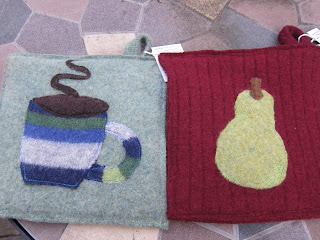We went to Cedar Summit Farm's Milkapalooza (family farm fun) today, and it was an educational visit.


We talked at length with John Zinn, grazing specialist for the USDA's Natural Resources Conservation Service. We already were proponents of raising cows on pasture, but John greatly expanded our knowledge, and now we know rotational grazing really is THE way to go for the full spectrum of benefits: environmental (fertile soil means rainwater's soaked up like a sponge, greatly reducing runoff and soil erosion), and animal and human health.
The Minars raise their 150 cows on pasture 5 to 6 months out of the year. Letting the animals forage for themselves results in:
1. much healthier animals, who instinctively choose which plants are the most nutritious for them
2. fewer vet bills
3. much lower machinery and fuel costs because you're bringing the cows to the food rather than vice versa
4. tamer animals
5. more nutritious milk, packed with conjugated linoleic acid
6. and a longer lifespan (they have some 15-year-old cows still producing milk vs. in a conventional milking situation the cows are done by age 6)
Also in this type of farming situation, calves stay with Mom for 2 months, getting TLC and learning to graze, vs. a calf in a conventional setting gets some colostrum and then right away is separated from Mom to be raised on a bottle.

The cows are rotated to a different parcel of land, called a paddock, every 12 hours. The weather we've had lately has resulted in lush vegetation growth, so the cows were happily picking their favorite edibles. The cows are averaging 60 to 70 lbs. of grass consumed per day!
In the pasture, manure is spread out over a large area and rapidly decomposes and fertilizes the soil (the dung beetles immediately go to work on fresh grass-fed cow patties because they're not full of antibiotics and pesticides). Contrast that with a factory-farm situation: John told us his cousin, who has 1,100 cows living in close, crowded quarters, has a man working for him whose sole job 8 hours a day is to clear manure with a skidder.

I just had to include this picture because I thought the cow underpass was brilliant. They use this tunnel under the road to move the cows back to the farm to be milked and then out to the pasture again.

And of course being Trashbasher, I collected 3 grocery bags of organics. I was really happy to see the family had set out a bin for plastic bottles. And as a result I found not one bottle in the trash.


Here's what the trash looked like after I took out the food and paper waste (the barrel was nearly full when I started).























